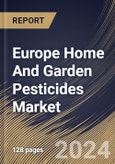With the rise of DIY culture, homeowners are increasingly taking pest control into their own hands. DIY pest control solutions, including natural remedies, homemade traps, and organic pesticides, are gaining popularity among environmentally conscious consumers. Education and awareness initiatives are crucial in shaping consumer perceptions and behaviour towards pest control. Public outreach programs, online resources, and educational campaigns empower consumers to make informed decisions about pest management practices.
Collaboration and partnerships between industry stakeholders, research institutions, and government agencies drive innovation and knowledge-sharing in the market. These collaborations facilitate the development of sustainable pest management solutions and support industry-wide efforts to address emerging pest challenges. Additionally, given the critical role of pollinators in ecosystems and agriculture, there is a growing emphasis on protecting pollinator health in the market. Consumers seek pollinator-friendly products and practices that minimize harm to bees, butterflies, and other beneficial insects.
The market will likely see increased competition and consolidation as companies seek to differentiate themselves through innovation, branding, and market positioning. Companies that invest in research and development, product differentiation, and sustainable practices will be well-positioned to succeed in the evolving market landscape. Regulatory requirements and consumer preferences will continue to drive changes in the market. Stricter regulations, bans on certain pesticide ingredients, and increased scrutiny of chemical pesticides may lead to developing alternative products and practices that meet regulatory standards and consumer expectations.
The expansion in the housing in Italy is giving a growth environment to market. According to the European Commission, EU funding for energy-efficient housing investment and social housing promotion are EUR 18.5 billion and EUR 2.8 billion, respectively. Additionally, households have steadily grown since 2010, reaching 26.1 million in 2020 (+5.7%). The mean equivalized net income, following an irregular trend since 2010, reached EUR 19,528 in 2019, representing a growth of 7.2% over the 2010-2019 period. Therefore, the expanding housing industry in the region propels the market's growth.
The Germany market dominated the Europe Home And Garden Pesticides Market by Country in 2022, and would continue to be a dominant market till 2030; thereby, achieving a market value of $711.8 Million by 2030. The UK market is registering a CAGR of 4.8% during (2023 - 2030). Additionally, The France market showcasing a CAGR of 6.6% during (2023 - 2030).
Based on Application, the market is segmented into Garden and Household. Based on Formulation, the market is segmented into Liquid and Powder. Based on Distribution Channel, the market is segmented into Offline and Online. Based on Type, the market is segmented into Herbicides, Insecticides, Fungicides and Fumigants. Based on countries, the market is segmented into Germany, UK, France, Russia, Spain, Italy, and Rest of Europe.
List of Key Companies Profiled
- BASF SE
- Central Garden & Pet Company
- Bayer AG
- Syngenta AG Group
- Reckitt Benckiser Group PLC
- DuPont de Nemours, Inc.
- Sumitomo Chemical Co., Ltd.
- Willert Home Products
- S.C. Johnson & Son, Inc.
- The Scotts Miracle-Gro Company
Market Report Segmentation
By Application- Garden
- Household
- Liquid
- Powder
- Offline
- Online
- Herbicides
- Insecticides
- Fungicides
- Fumigants
- Germany
- UK
- France
- Russia
- Spain
- Italy
- Rest of Europe
Table of Contents
Companies Mentioned
- BASF SE
- Central Garden & Pet Company
- Bayer AG
- Syngenta AG Group
- Reckitt Benckiser Group PLC
- DuPont de Nemours, Inc.
- Sumitomo Chemical Co., Ltd.
- Willert Home Products
- S. C. Johnson & Son, Inc.
- The Scotts Miracle-Gro Company








